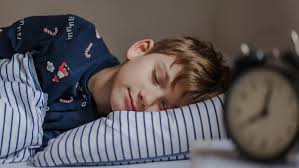
INDIANA – How does screen time affect your child’s sleep patterns?
Sleep is important for growing and developing brains. According to the CDC, toddlers need 11-14 hours of sleep, preschool-aged kids need 10-13 hours, school-aged kids need 9-12 hours, teens need 8-10 hours, and adults need at least seven hours per 24-hour time period.

Sleep is an important indicator of overall physical and mental health. Several things can interfere with a healthy sleep schedule, but in recent years, screen time has been high on the list for school-aged children.
Our sleep cycle (circadian rhythm) mostly takes its cue from sunlight. Our brains register when we need sleep based on when it becomes dark. When our circadian rhythm is out of sync, it can lead to insomnia. According to sleepfoundation.org, smartphones, tablets, computers, television screens, and some e-readers give off short-wavelength blue light very similar to sunlight. The blue light from these devices makes individuals more alert and prevents melatonin production in the user’s body.

Not getting enough sleep can cause school-aged children to struggle at home and school. This can lead to poor school performance, poor attitude, decreased mental health, and conflicts in relationships. It can also contribute to students’ inability to self-regulate, which can lead to more disciplinary issues.

According to Afy Okoye on sleepdoctor.com, “Not getting sleep puts teens in a haze. That can negatively affect how they think, react, and learn. It also impacts their ability to control emotions and get along with adults. Not getting sleep can cause traffic accidents and accidental injuries, resulting in teens acting impulsively and recklessly.”
According to Dr. Michael Breus, the average teen uses electronics more than seven hours a day. They use electronics for school and personal devices such as tablets, cell phones, and televisions. When teens and school-aged children spend more time on their devices, they get fewer hours of sleep each night.
Here are some tips to help students improve their sleep schedules and ensure they get more hours of sleep each night:
1. Set boundaries for screen time. Have a conversation with your child and let them know your limits.
2. Stop using devices at least an hour before bed. To make this easier, have a set bedtime.
3. Remove electronics from the bedroom.
4. Wear blue light-blocking glasses.
5. Set a schedule and time limit for daily usage.
6. Practice good sleeping habits. Lead by example. Show your children how you follow these rules to improve your sleep habits.
7. Give options of activities that students can do instead of using devices, such as reading a book, coloring, journaling, or spending time with family.
Sleep plays a significant role in our children’s physical and emotional health. Too much screen time influences the amount and quality level of sleep. Setting screen time limits for our children can help them improve their sleep health and overall well-being.

Amanda Haney, MSW, LSW, is a Youth First Mental Health Professional at Mooresville High School in Morgan County. Youth First, Inc., is a nonprofit dedicated to strengthening youth and families. Youth First provides 90 highly trained mental health professionals (primarily master’s level social workers), prevention programs, parent engagement coordinators, and bilingual support personnel to 125 schools across 14 Indiana counties. Over 52,000 youth and families yearly are served by Youth First’s school-based social work and community programs that promote mental health, prevent substance misuse, and maximize student success. To learn more about Youth First, visit youthfirstinc.org or call 812-421-8336.



